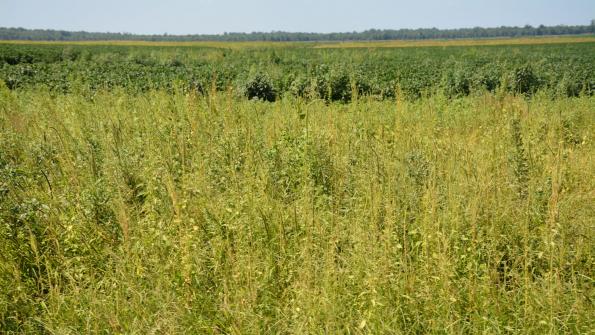
EPA schedules new SAP for glyphosate review for Dec. 13-16
<p>The question of whether <span data-scayt-lang="en_US" data-scayt-word="glyphosate">glyphosate</span> is or is not carcinogenic has taken on new importance following claims by environmental activists the compound has now been found in breakfast cereals, crackers and other snack foods.</p>
November 18, 2016

EPA has scheduled a newly-constituted Federal Insecticide, Fungicide and Rodenticide Act Scientific Advisory Panel to review its findings that the herbicide glyphosate is probably not carcinogenic to humans.
The panel is expected to meet Dec. 13-16 in Arlington, Va. An earlier meeting of a slightly different panel scheduled in mid-October was postponed due to scheduling problems for some of its members, according to EPA.
The agency said Peter Infante, an epidemiologist who formerly worked for the Occupational Safety and Health Administration, will not serve on the new panel. Four additional scientists, including a professor at the University of Arkansas for Medical Sciences, Little Rock, will join the SAP.
Organizations such as CropLife America, which represents pesticide manufacturers, criticized the selection of Dr. Infante for the original panel, noting he had testified against Monsanto in lawsuits against the company that sells glyphosate, the active ingredient in Roundup herbicide.
They also questioned the selection of Kenneth Portier, vice president, Statistics and Evaluation Center, American Cancer Society, Atlanta, Ga., who remains on the SAP. Portier is the brother of Christopher Portier, who has written a number of articles defending a March 2015 report by the International Agency for Research on Cancer that said glyphosate probably does cause cancer in humans.
Critical of pesticides
Infante reportedly said he was “mystified” on learning he would no longer serve on the SAP, although testimony in court cases indicated he has been highly critical of EPA’s registration of glyphosate for use on genetically-engineered crops.
“I didn’t choose to leave the panel,” he told a reporter. “No, I was removed from the panel… I’m totally mystified by it.”
Environmental activist groups say it’s highly unusual for EPA to remove members from Scientific Advisory Panels after they have been constituted. They said Infante’s views on glyphosate had to have been known when the panel was first selected.
CropLife America officials said Infante’s views went beyond his testimony about glyphosate in court cases. They cited his work with the Collegium Ramazzini, an Italian-based organization that has issues statements critical of pesticide use in general.
“I don’t think it’s a bad thing we asked, and I don’t think it’s a bad thing they looked at our concerns,” said Janet E. Collins, senior vice president for science and regulatory affairs at CropLife America, following the announcement of the new SAP meeting dates.
Glyphosate in cereal?
The question of whether glyphosate is or is not carcinogenic has taken on new importance following claims by environmental activists the compound has now been found in breakfast cereals, crackers and other snack foods. The statements are bound to touch off another round of questioning about the safety of the herbicide.
In documents released earlier this fall, EPA said it has determined glyphosate is probably not carcinogenic in humans, a finding shared by such organizations as the European Food Safety Agency and the New Zealand equivalent of EPA.
The International Agency for Research on Cancer, which is often identified as an arm of the World Health Organization although it has no such standing, is one of the few entities that has issued reports saying it believes the herbicide is probably carcinogenic.
The convening of a scientific advisory panel is one of the procedures EPA routinely follows to make sure its regulatory approvals are grounded in sound science and the latest research available on the issues.
EPA has said it will issue a risk assessment for glyphosate by spring 2017.
The new roster of SAP members includes:
Marion F. Ehrich, co-director, Laboratory for Neurotoxicity Studies, professor, pharmacology and toxicology, Department of Biomedical Sciences & Pathobiology, Virginia-Maryland Regional College of Veterinary Medicine, Blacksburg, Va.
David A. Jett, director, National Institute of Health CounterACT Program, National Institute of Neurological Disorders and Stroke, National Institutes of Health, Bethesda, Md.
Joseph Shaw, associate professor, School of Public and Environmental Affairs, Indiana University, Bloomington, Ind.
Sonya K. Sobrian, associate professor, Department of Pharmacology, Howard University College of Medicine, Washington, D.C.,
Kenny Crump, private consultant, Ruston, La.
Laura C. Green, president and senior toxicologist, Green Toxicology LLC, Brookline, Mass.,
Kristi Muldoon Jacobs, director (acting), Regulations Implementation Staff, Office of Dietary Supplement Programs, Center for Food Safety and Applied Nutrition, US Food and Drug Administration, College Park, Md.
Eric S. Johnson, professor, Department of Epidemiology, University of Arkansas for Medical Sciences, Little Rock, Ark.
Barbara L. Parsons, research microbiologist, Division of Genetic and Molecular Toxicology, National Center for Toxicological Research, U.S. Food and Drug Administration, Jefferson, Ark.
Kenneth Portier, vice president, Statistics and Evaluation Center, American Cancer Society, Atlanta, Ga.
Aramandla Ramesh, associate professor, Department of Biochemistry & Cancer Biology, Meharry Medical College, Nashville, Tenn.
Lianne Sheppard, professor and assistant chair of Environmental and Occupational Health Sciences, University of Washington, Seattle, Wash.
Emanuela Taioli, director, Institute for Translational Epidemiology, Icahn School of Medicine at Mount Sinai, New York, N.Y.
Heather Young, professor and vice chair, Department of Epidemiology and Biostatistics, George Washington University, Washington, D.C.
Daniel Zelterman, professor of public health (biostatistics), Department of Biostatistics, Yale School of Medicine, New Haven, Conn.
Luoping Zhang, professor in toxicology, School of Public Health, University of California, Berkely, Berkely, Calif.
For more information on the SAP, visit http://bit.ly/2f5ajyf
About the Author(s)
You May Also Like





